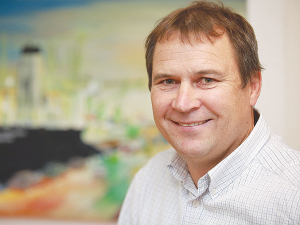Scales declares strong first half performance
Scales Corporation has today reported its results for the first half of the 2025 financial year, revealing what it says are outstanding results from its horticulture and logistics divisions.
 Scales Corporation managing director Andy Borland says the company is pleased to announced its purchase of Bostock Group orchards.
Scales Corporation managing director Andy Borland says the company is pleased to announced its purchase of Bostock Group orchards.
Scales Corporation is acquiring a number of orchard assets from Bostock Group.
According to an announcement to the NZX, the transaction includes 240 hectares of planted orchard area comprised of 114 hectares of owned orchards and the assignment of 126 hectares of leased orchard.
The total acquisition, priced at $47.5m, also includes the purchase of 50% of Profruit (2006) Limited held by Bostock.
At the same time, Mr Apple will put its Blyth and Te Papa orchards up for sale, part of Scales’ strategy to improve Mr Apple's margins.
By acquiring the Bostock orchards and selling the Mr Apple orchards, the company will broadly maintain its total orchard area while achieving a meaningful uplift in its premium variety volumes.
Scales Corporation managing director Andy Borland says the company is “extremely pleased” to announce the transaction.
“Scales and Mr Apple have worked closely with John Bostock and his team over multiple decades and expect to continue to work closely together to collectively grow the industry,” Borland says.
“Bostock orchards are renowned for their premium quality produce and the orchards being transferred are optimally located, with strong strategic alignment to existing Mr Apple orchards,” he adds.
Borland says Scales Corporation’s Mr Apple strategy is to focus on the sale of premium varieties to Asia and the Middle East markets, while driving improved margins from the brand’s existing assets rather than expanding the asset base.
“The transactions announced will achieve those objectives,” he says. “DazzleTM has been a highly successful variety for Mr Apple, and this transaction materially accelerates our strategy of increasing DazzleTM volumes. By inheriting mostly mature blocks we will have higher volumes of DazzleTM apples from 2025.”
Bostock Group managing director, John Bostock, says he is pleased that Scales is acquiring the orchards.
“The distinction between ‘organic’ and ‘conventional’ fruit is of a lower significance in Asia, where DazzleTM has strong market appeal,” Bostock says.
“It is a natural fit for these orchards to be operated by Mr Apple and for the Bostock group to continue to service its customers in other markets with Bostock’s other varieties. There is a strong cultural alignment between our two businesses, and I feel confident that any staff moving between the growers will find themselves well at home at Mr Apple.”
Scales Corporation chair, Mike Petersen, says that migrating the orchard mix to favour higher percentages of premium varieties is a core strategic imperative for Mr Apple as well as the country’s broader horticultural industry.
“PVR varieties, such as DazzleTM, are more sought after than our traditional varieties, reflecting the superior colour qualities and eating experience,” Petersen says.
“This allows the industry to continue to invest, innovate and expand while also creating high-value employment opportunities,” he adds. “Profruit is an extremely well-run business and we are very pleased to move to outright ownership.”
The purchase is subject to closing conditions and is expected to be completed in early to mid-June 2024.
Meanwhile, the Mr Apple orchard sales are not expected to conclude until the second half of the year.
The 5+ A Day Charitable Trust has launched a collection of affordable recipes designed to turn everyday vegetables into seasonal stars.
Jane Mellsopp has been confirmed as the new Government Appointee to the New Zealand Meat Board (NZMB).
To celebrate the tenth anniversary of its annual Good Deeds competition, Rabobank will give away $100,000 to improve rural community hubs, schools, clubrooms, and marae across New Zealand.
Agricultural and veterinary product supplier Shoof International has appointed Michaela Dumper as its new chief executive.
Federated Farmers is celebrating following the Government's announcement that young farmers will be able to use their KiwiSaver funds to buy their first home or farm.
The Meat Industry Association of New Zealand (MIA) today announced that Chief Executive Officer Sirma Karapeeva has resigned from the role.

OPINION: A mate of yours truly reckons rural Manawatu families are the latest to suffer under what he calls the…
OPINION: If old Winston Peters thinks building trade relations with new nations, such as India, isn't a necessary investment in…